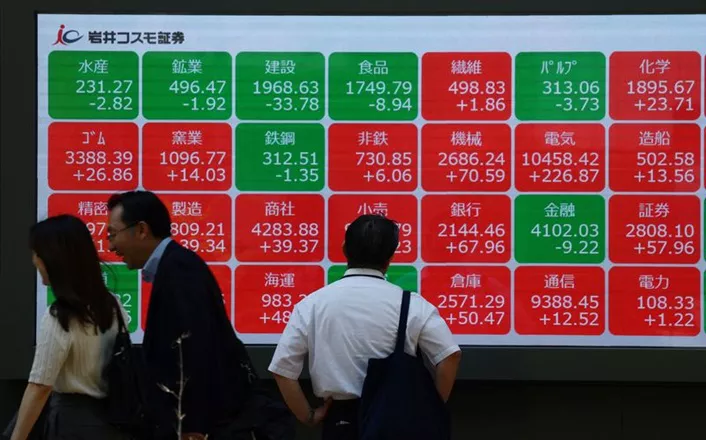Stocks climbed in Asia on Wednesday, while the U.S. dollar showed weakness after softer U.S. inflation data raised hopes for Federal Reserve rate cuts later this year. Despite easing trade tensions, investors remained cautious about the global economic outlook.
Market sentiment improved following a temporary truce in the trade dispute between the U.S. and China. Although President Donald Trump’s global trade strategy has rattled markets, the pause offered some relief.
“I’m just a little bit cautious here about chasing the rally in stocks at this level,” said Tony Sycamore, an analyst at IG. “We need to see more clarity around future tariff talks with other countries. Right now, the worst-case scenario seems to be priced out.”
MSCI’s broadest index of Asia-Pacific shares outside Japan gained 0.9% in early trading. The boost followed a recovery in U.S. stocks, which have now erased losses caused by earlier tariff announcements.
Hong Kong’s Hang Seng index rose, led by gains in technology stocks. The rally followed strong earnings from Chinese e-commerce firm JD.com. Investors are now awaiting results from tech giants Tencent and Alibaba.
However, equity futures signaled potential declines in both European and U.S. markets.
The latest U.S. inflation data offered reassurance. Consumer prices rose less than expected, easing concerns that tariffs might trigger a rapid rise in inflation and delay any rate cuts from the Federal Reserve.
Still, uncertainty remains as Washington continues to negotiate trade deals with other major economies. Despite expected inflation from higher import costs, investors are watching closely to see if further progress can be made.
Global sentiment received a boost after a recent U.S.-UK trade deal and improved further when the U.S. and China agreed on Monday to pause their tariff war for 90 days. Both sides committed to lowering duties and negotiating a longer-term agreement.
President Trump also hinted at potential trade deals with India, Japan, and South Korea.
The Federal Reserve has acknowledged growing economic uncertainty and signaled it is willing to wait before making further decisions on interest rates.
The dollar, under pressure from policy and economic concerns, fell 0.2% against the yen to 147.13 and was steady at $1.1186 against the euro. The dollar index remained flat after falling 0.8% in the previous session.
Japan’s Nikkei index fell 0.7%, giving back part of a 1.4% rise from earlier in the week.
With the inflation report now past, markets are eyeing April retail sales data due Thursday for the next signal on U.S. economic health. On the same day, Ukraine and Russia are set to meet in Istanbul for ceasefire talks amid Europe’s most deadly conflict since World War II.
Meanwhile, global asset managers in May held their largest underweight position in the dollar in nearly two decades, according to a Bank of America survey. This shift reflects declining confidence in U.S. assets due to trade uncertainty.
The yield on 10-year U.S. Treasury notes slipped 2 basis points to 4.4768%.
In commodities, U.S. crude dipped 0.3% to $63.48 per barrel, while spot gold edged slightly lower to $3244.79 an ounce.
Related topics:


